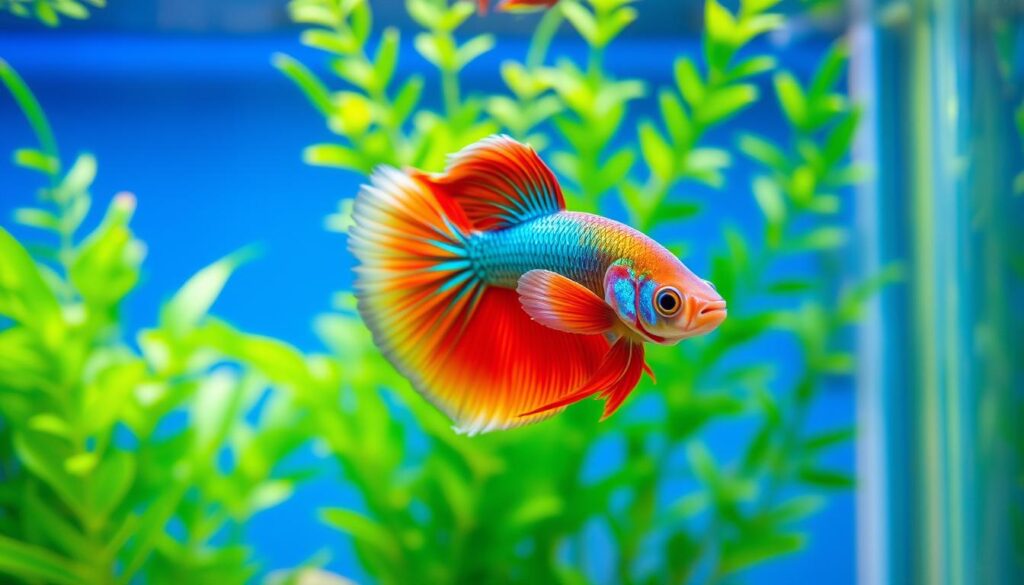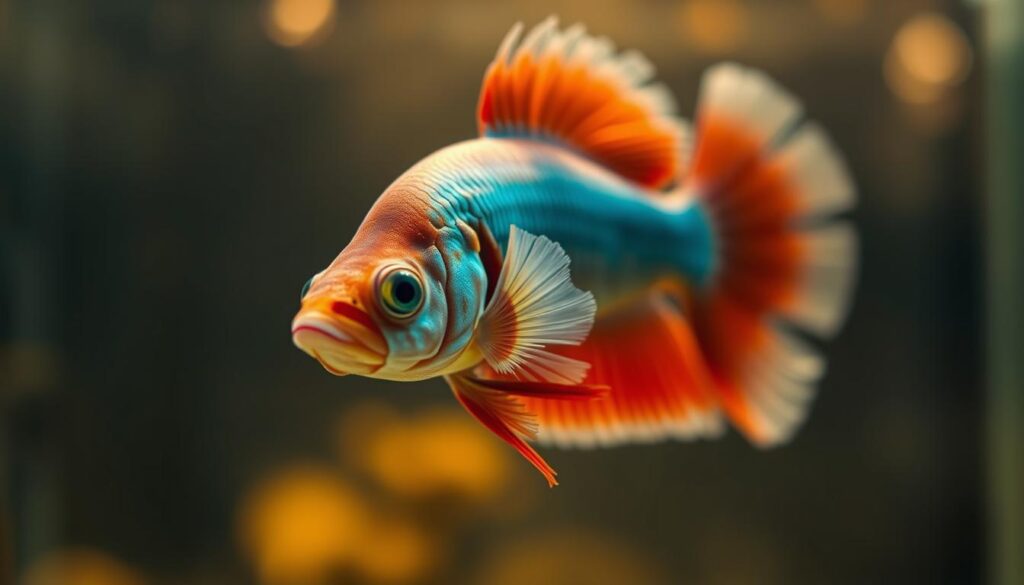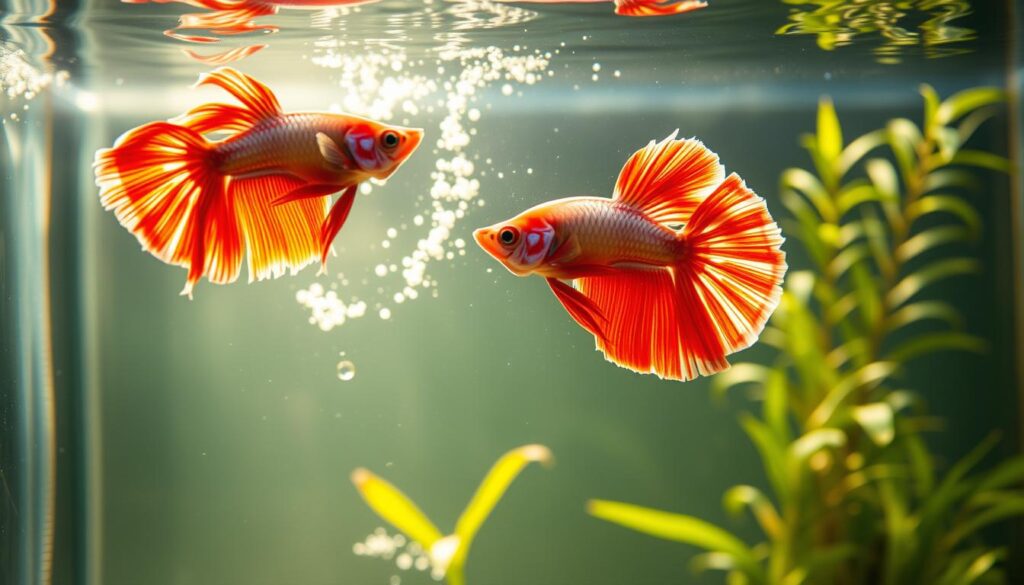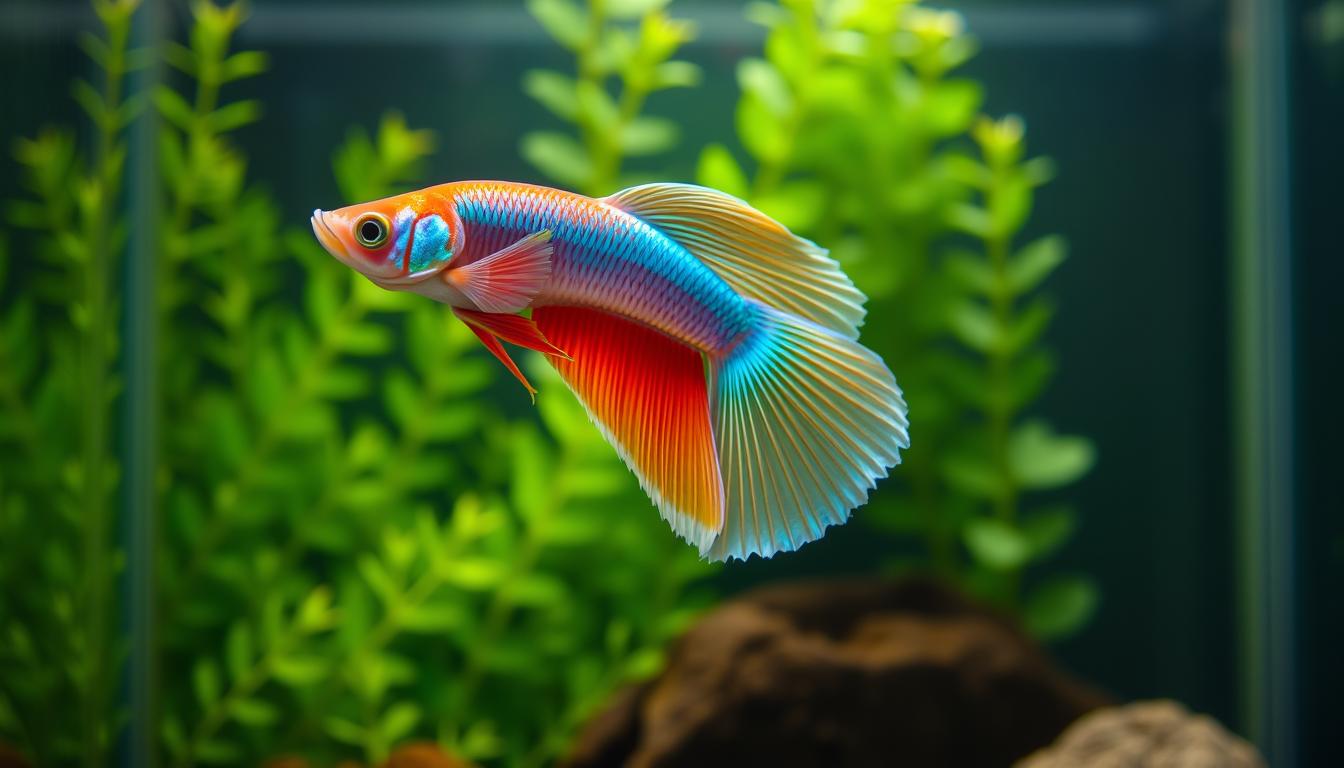When it comes to aquarium care, one question often confuses new owners: does betta fish needs oxygen? Many believe bettas can survive without it because they breathe air from the surface. But is that belief truly safe—or just a myth waiting to harm your fish? In this blog, we’ll uncover the real science behind your betta’s oxygen needs, what setups are ideal, and how lack of proper oxygenation could silently affect their health. If you love your betta, this is something you can’t ignore.
Knowing what your betta fish needs for oxygen is key to their happiness. In this article, we’ll talk about why oxygen levels matter in betta fish care. We’ll also show you how to make sure your tank has enough oxygen.
Key Takeaways
- Understanding the unique respiratory system of betta fish and their oxygen requirements.
- The importance of maintaining adequate oxygen levels in your betta fish tank.
- Practical tips on how to oxygenate your betta fish tank effectively.
- Common mistakes to avoid when caring for betta fish in terms of oxygen supply.
- How a well-oxygenated tank contributes to the overall health and happiness of your betta fish.
Read Also Can Betta Fish Survive in Tap Water? The Shocking Truth
Understanding the Myth: Does Betta Fish Needs Oxygen or Not?
Many people believe that betta fish don’t need oxygen because they have a special organ called the labyrinth, which allows them to breathe air from the water surface. While it’s true that bettas can survive in low-oxygen environments, that doesn’t mean they don’t need oxygen at all. Bettas still require dissolved oxygen in the water to stay healthy, active, and stress-free.
The Unique Respiratory System of Betta Fish
Betta fish have a special organ called the labyrinth organ. It lets them breathe air from the surface. This is key for their survival in low-oxygen waters, like those in Thailand.
Betta fish can live in places where other fish can’t. Their respiratory system shows nature’s amazing flexibility. They have gills for water oxygen and a special labyrinth organ.
Labyrinth Organ: Nature’s Adaptation
The labyrinth organ is a remarkable example of evolution. It’s a complex structure above the gills. It lets betta fish breathe in oxygen from the air.
How the Labyrinth Organ Developed
The labyrinth organ developed because of betta fish’s habitat. They adapted to breathe atmospheric oxygen in low-oxygen environments.
Functionality in Modern Bettas
In modern betta fish, the labyrinth organ is vital. It helps them breathe in low-oxygen conditions. They can also breathe air from the surface, making them very resilient.
Read Also How to Use Aquarium Salt for Betta Fish Fin Rot the Wrong Way
Here’s a comparison of the key features of the labyrinth organ and gill breathing in betta fish:
| Feature | Labyrinth Organ | Gill Breathing |
|---|---|---|
| Oxygen Source | Atmospheric air | Dissolved oxygen in water |
| Efficiency in Low-Oxygen Water | Highly efficient | Limited efficiency |
The labyrinth organ gives betta fish a big advantage in low-oxygen environments.
Knowing about their unique respiratory system helps you care for your betta fish better.
Does Betta Fish Need Oxygen? The Surprising Truth
Let’s explore the truth about betta fish and oxygen. Many believe betta fish can live in small bowls because they breathe air. But this is a myth that can harm them.

Betta fish, also known as Siamese fighting fish, are often seen as easy pets. They can survive in low oxygen levels thanks to their labyrinth organ. But, they need a healthy, oxygen-rich environment to thrive.
Common Misconceptions About Betta Breathing
Many think betta fish can live in small bowls without filters. This myth comes from their ability to breathe air in shallow, poor waters. But, surviving and thriving are different!
The “Bowl Myth” Debunked
The idea that betta fish can live in small bowls without filters is false. These fish need oxygen to survive. They can get some oxygen from air, but they need a well-oxygenated tank. Keeping them in small, unfiltered bowls can cause health issues like stunted growth and disease.
Why These Myths Persist
Why do these myths keep going? Betta fish are very resilient. They can survive in bad conditions for a while, making it seem like they’re doing well. But, with the right care, including enough oxygen, they can live a long, healthy life – up to 5 years or more!
To keep your betta fish healthy, you must understand their oxygen needs. By creating a suitable environment, you can ensure your betta stays happy and healthy. So, does betta fish need oxygen? Yes! And with proper care, you’ll enjoy a thriving, vibrant betta for years.
Breaking News: Recent Research Reveals Optimal Oxygen Levels for Bettas
Exciting news for betta enthusiasts – recent studies have found the best oxygen levels for these beloved fish! This new research is a game-changer for anyone wanting to give their betta the best care.

2023 Studies on Betta Fish Health and Oxygen
The year 2023 has seen big steps forward in understanding betta fish oxygen requirements. Researchers have done detailed studies to find the perfect oxygen levels for betta fish health.
Key Findings from University Research
A recent university study found that betta fish do best in specific oxygen levels. The research showed that maintaining optimal oxygen levels is key for betta fish health and longevity. It found that oxygen levels should be between 4-8 ppm for the best health.
Statistical Data on Survival Rates
The research’s data is very telling. Betta fish in tanks with the right oxygen levels had a significant increase in survival rates. In fact, survival rates went up by up to 30% when oxygen levels were kept in the recommended range.
By following these findings, you can greatly improve your betta fish’s health and happiness. It’s a simple yet powerful change that can really make a difference in their well-being.
Signs Your Betta Is Suffering from Oxygen Deficiency
If your betta is gasping at the surface or seems lethargic, it might be struggling with oxygen levels. Betta fish, despite their ability to breathe air from the surface, need enough oxygen dissolved in the water to thrive.
Behavioral Indicators to Monitor
Watching your betta’s behavior is key to spotting oxygen issues. Changes in behavior can be small, so pay close attention.
Surface Gasping and Its Significance
Surface gasping is a common sign of low oxygen. If your betta often goes to the surface to breathe, it might mean the water lacks oxygen. This behavior is a distress signal, showing your betta is struggling to breathe.
Activity Level Changes
A drop in activity can also point to oxygen problems. If your betta seems tired or less active, it might not have enough oxygen. Watch for changes in their usual behaviors, like swimming or reacting to food, as these can hint at issues.

Knowing these signs and acting quickly can help keep your betta healthy. Regular checks and keeping the tank conditions right are vital to avoid oxygen issues.
The Impact of Tank Size on Oxygen Availability
The size of your betta’s tank greatly affects their oxygen supply. We’re about to explore why! For oxygen for betta fish tank, a larger tank is better. It keeps the environment stable, which is vital for healthy oxygen levels.
Minimum Tank Requirements for Healthy Oxygen Levels
A 5-gallon tank is often recommended for betta fish care. It’s for a good reason! A 5-gallon tank has enough water to dilute waste and keep water parameters stable. This is key for betta fish care oxygen levels.
The Science Behind the 5-Gallon Recommendation
The 5-gallon rule isn’t random. It’s based on the idea that more water volume resists sudden water quality and temperature changes. This stability is essential for your betta’s oxygen levels.
Consequences of Undersized Tanks
Keeping your betta in a small tank can cause many problems. These include stress, disease, poor water quality, and less oxygen. So, for oxygen for betta fish tank, bigger is better!
Choosing a 5-gallon tank or larger gives your betta the best chance at a healthy life. It ensures they have the right betta fish care oxygen levels.
Water Temperature and Its Effect on Oxygen Levels
Water temperature is key for your betta fish’s health. It affects how oxygen dissolves in the water. This directly impacts your betta’s ability to breathe!

Ideal Temperature Range for Betta Fish
Betta fish do best in water between 76°F and 82°F (24°C to 28°C). Keeping this range is vital for maintaining oxygen levels for betta fish. If the water is too cold, your betta’s metabolism slows, reducing oxygen need. But, water that’s too warm increases oxygen use, making it harder for your betta to breathe!
Why Proper Oxygenation Still Matters in a Betta Tank
Even though bettas are air-breathers, poor water quality and zero oxygen circulation can weaken their immune systems and lead to diseases. Without oxygen-rich water, they may show signs of stress—like staying near the surface, breathing heavily, or being less active. Adding a gentle filter, live plants, or an air stone can help improve oxygen levels and keep your betta happier.
Seasonal Adjustments
Seasonal changes affect your home’s temperature, impacting your betta tank. In winter, you might need a heater. In summer, watch the tank’s temperature to avoid it getting too warm. Are you ready to adjust for the seasons?
Heater Selection and Placement
Choosing the right heater and placing it correctly is essential. Find a heater that fits your tank size. Place it where water circulates well to spread heat evenly. This keeps your betta in a consistent temperature, promoting healthy betta fish oxygenation.
When picking a heater, consider these:
- Adjustable thermostat
- Accurate temperature control
- Safe operation (e.g., automatic shut-off)
By keeping the water at the right temperature and adjusting for seasons, you ensure your betta fish gets the best oxygen. This leads to a happy and healthy life for your betta!
Effective Methods to Increase Oxygen in Your Betta Tank
Let’s explore the best ways to keep your betta tank oxygenated! You might wonder why oxygen is so important. It’s key for your betta’s health and happiness!
There are many ways to add oxygen, like air pumps and live plants. Finding the right balance is important. Let’s look at the most effective methods!
Air Pumps and Bubblers: Are They Necessary?
Air pumps and bubblers are popular for adding oxygen. But, do they need to be in every betta tank? It depends on your tank size and setup. Small, unfiltered tanks might benefit from an air pump.
Low-Flow Options for Bettas
Choosing a low-flow air pump or bubbler is vital. Bettas aren’t strong swimmers and can get stressed by strong currents. Look for devices that offer a gentle flow, so your betta can swim easily.
Proper Placement for Maximum Benefit
Where you put your air pump or bubbler is important. Place it near the surface to increase oxygen exchange. You can also put it near decorations or plants to create a gentle current that spreads oxygen.
| Method | Oxygen Increase | Ease of Use |
|---|---|---|
| Air Pumps | High | Easy |
| Live Plants | Moderate | Moderate |
| Surface Agitation | Low to Moderate | Easy |
There are many ways to increase oxygen in your betta tank. By understanding these methods, you can create a healthy space for your betta to flourish.
The Role of Water Quality in Oxygen Availability
Water quality is key to keeping your betta tank healthy. It’s not just about the water looking clean. The quality affects your betta’s ability to breathe!
Poor water quality can lower oxygen levels. This stresses your betta and makes them more likely to get sick. So, what affects water quality? Let’s explore.
How Ammonia and Nitrates Affect Oxygen Uptake
Ammonia and nitrates are common pollutants in aquariums. They can harm your betta’s gills, making it hard for them to breathe.
Nitrates are less toxic but can cause stress and health issues. This makes your betta more vulnerable to oxygen problems.
The Nitrogen Cycle Explained
The nitrogen cycle is vital in your aquarium. It turns ammonia into nitrites and then nitrates. Knowing this cycle helps keep your water quality good.
“The nitrogen cycle is a delicate balance between beneficial bacteria and your betta’s waste. By supporting this cycle, you can keep your tank water healthy and your betta thriving.”
Testing Protocols for Home Aquarists
Regular water testing is essential. It helps monitor the nitrogen cycle and ensures good water quality. Use test kits to check for ammonia, nitrites, and nitrates.
| Parameter | Ideal Range | Action if High |
|---|---|---|
| Ammonia | 0 ppm | Perform partial water change |
| Nitrites | 0 ppm | Check for new fish or decaying matter |
| Nitrates | <20 ppm | Perform partial water change, consider adding live plants |
By monitoring these parameters and taking action when needed, you can create a healthy environment for your betta.
Seasonal Changes and Their Impact on Betta Fish Oxygen Needs
As the seasons change, your betta fish’s oxygen needs change too. You might wonder how outside temperature and humidity affect your betta’s water. Let’s explore how seasonal changes impact your betta’s oxygen needs and how to keep them healthy.
Summer Care: Preventing Oxygen Depletion
Summer brings the risk of oxygen depletion in your betta tank. Warmer water speeds up your betta’s metabolism, increasing their oxygen demand. To keep your betta safe, you need to act fast.
Heat Wave Emergency Measures
During a heat wave, watch your tank’s temperature closely. Use a thermometer to keep it between 76-82°F, ideal for betta fish. Consider using a fan or air conditioner near your tank to cool the water. In extreme cases, add ice packs wrapped in a towel to the tank to lower the temperature slowly.
Adjusting Feeding During Hot Weather
When it’s hot, your betta might eat less. Don’t overfeed! Overfeeding can lead to poor water quality and lower oxygen levels. Instead, feed your betta smaller, more frequent meals. This helps keep water quality good and ensures your betta gets the nutrients they need.
Here’s a quick summary of how to maintain healthy oxygen levels for your betta fish during seasonal changes:
| Season | Oxygen Needs | Care Tips |
|---|---|---|
| Summer | Increased oxygen demand due to warmer water | Monitor temperature, avoid overfeeding, consider cooling measures |
| Other Seasons | Varying oxygen needs based on temperature | Adjust tank conditions, maintain good water quality |
New Products That Help Maintain Healthy Oxygen Levels
Keeping your betta fish healthy means keeping oxygen levels right. Luckily, many new products can help. With so many choices, picking the right one can be tough. Let’s look at some top picks to keep your betta happy and healthy.
Top-Rated Air Pumps for Betta Tanks
Air pumps boost oxygen in your betta tank. Here are some top picks:
Whisper-Quiet Models for Bedroom Setups
If your betta tank is in your bedroom, you need a quiet air pump. The Tetra Whisper Air Pump and the Hydor Lido Air Pump are great. They’re super quiet, so you and your fish won’t be disturbed.
Battery-Powered Options for Emergencies
For power outages, battery air pumps are a good backup. The Active Aqua Air Pump is a favorite. It works well and lasts a long time on battery.
| Product | Noise Level | Battery Life |
|---|---|---|
| Tetra Whisper Air Pump | Very Quiet | N/A |
| Hydor Lido Air Pump | Very Quiet | N/A |
| Active Aqua Air Pump | Moderate | Up to 12 hours |
When picking an air pump, think about noise, battery life, and how well it works. This will help you choose the best one for your betta.
Conclusion of Does Betta Fish Needs Oxygen
Now you know how important oxygen is for your betta fish. You can make their home better by understanding their oxygen needs. This will keep them happy and healthy.
To keep your betta fish healthy, check the water quality and tank size. Also, use the right equipment like air pumps. These steps will help your betta fish get the oxygen they need.
Remember, keeping oxygen levels healthy is a continuous task. Stay alert and practice. Soon, you’ll be great at keeping your betta fish happy. Happy aquarium keeping, and here’s to a thriving betta fish community!

